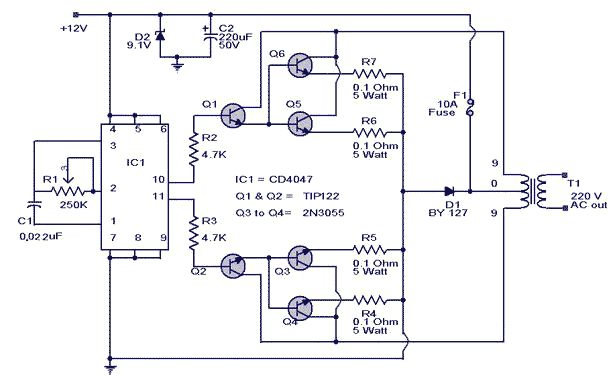Here is a 100 Watt inverter circuit using minimum number of components. I think it is quite difficult to make a decent one like this with further less components. Here we use CD4047 IC from Texas Instruments for generating the 100 Hz pulses and four 2N3055 transistors for driving the load.
The IC1 CD4047 wired as an astable multivibrator produces two 180 degree out of phase 100 Hz pulse trains. These pulse trains are preamplified by the two TIP122 transistors. The out puts of the TIP122 transistors are amplified by four 2N3055 transistors (two transistors for each half cycle) to drive the inverter transformer. The 220V AC will be available at the secondary of the transformer. Nothing complex just the elementary inverter principle and the circuit works great for small loads like a few bulbs or fans. If you need just a low cost inverter in the region of 100 W, then this is the best.
Circuit Diagram with Parts List

Notes
- A 12 V car battery can be used as the 12V source.
- Use the POT R1 to set the output frequency to 50Hz.
- For the transformer get a 9-0-9 V , 10A step down transformer.But here the 9-0-9 V winding will be the primary and 220V winding will be the secondary.
- If you could not get a 10A rated transformer, don’t worry a 5A one will be just enough. But the allowed out put power will be reduced to 60W.
- Use a 10 A fuse in series with the battery as shown in circuit.
- Mount the IC on an IC holder.
- Remember, this circuit is nothing when compared to advanced PWM inverters. This is a low cost circuit meant for low scale applications.
Design Tips
The maximum allowed output power of an inverter depends on two factors. The maximum current rating of the transformer primary and the current rating of the driving transistors.
For example, to get a 100 Watt output using 12 V car battery the primary current will be ~8A, (100/12) because P=VxI. So the primary of transformer must be rated above 8A.
Also here, each final driver transistors must be rated above 4A. Here two will be conducting parallel in each half cycle, so I=8/2 = 4A .
These are only rough calculations and enough for this circuit.